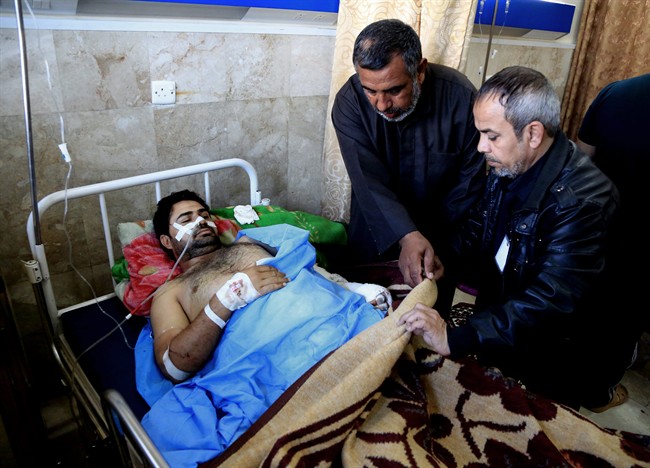BAGHDAD – Four suicide bombers disguised as soldiers struck an Iraqi military headquarters in the western town of Haditha on Tuesday, killing eight army officers, including a local commander, in an attack claimed by the Islamic State group.

Local councilman Khalid Salman said one of the bombers attacked the gate of the compound and the others struck after soldiers gathered to help the victims. He said eight soldiers were wounded in the attack.
IS claimed the assault in online statements issued on jihadi websites, saying it was carried out by two Syrian suicide bombers. The AP could not confirm the authenticity of the statements, but they resembled previous announcements issued by the group.
READ MORE: Iraqi forces launch push to retake area north of Baghdad
Haditha is some 240 kilometres (150 miles) northwest of Baghdad, near a key dam on the Euphrates. IS has attacked the town on a number of occasions, but has never been able to seize it.
Iraqi forces, primarily Shiite militias, meanwhile launched a new push to retake a sprawling desert area outside the central city of Samarra, home to one of Shiite Islam’s holiest shrines, officials said.
They hope to cut IS supply lines and tighten the noose around the IS-held northern city of Mosul — Iraq’s second largest — according to a statement by the Joint Operations Command. The statement said Iraqi warplanes were supporting the mission. It did not say if the U.S.-led international coalition was involved.
Shiite lawmaker Ahmed al-Asadi, a spokesman for the paramilitary forces, said the offensive “is in retaliation for the blood of our martyrs and to annihilate the terrorist gangs that have wreaked havoc.”
Sabah Al-Numan, the spokesman for national counter-terrorism forces, told The Associated Press that two vehicles loaded with militants were bombed on Tuesday, and that the security forces struck a would-be suicide car bomber before he reached his target.
READ MORE: Suicide bombing at Iraqi funeral kills at least 25
Iraqi forces have advanced against IS in recent months, driving the extremists from the western city of Ramadi and pushing them back on other fronts. But progress has been slow, and IS has launched counterattacks, often involving multiple suicide bombers.
Massive bombings claimed by IS over the last two days in Baghdad and the northeastern town of Muqdadiyah killed at least 110 people. On Tuesday, separate attacks in and around Baghdad killed at least 13 people and wounded 31 others, according to police and health officials.
In one attack, militants broke into a soldier’s home south of Baghdad, killing his wife and two children, aged seven and five years old, a police officer said. The solider was critically wounded, he added.
The officials spoke on condition of anonymity because they were not authorized to brief reporters.
Visiting Baghdad on Tuesday, NATO Secretary General Jens Stoltenberg said the alliance would begin training Iraqi officers in Jordan.
“Iraqi officers will receive training in key priority fields, including countering Improvised Explosive Devices, military medicine and civil-military planning,” Stoltenberg said in a statement.
The U.S.-led coalition against IS has trained more than 18,000 Iraqi troops since December 2014. Iraqi officials have called for an increase in the pace of training efforts ahead of a planned Mosul offensive that Iraq’s prime minister has promised will begin this year. Coalition officials say it is too early to set a timeline for the operation.
IS still controls large areas of northern and western Iraq that it seized in the summer of 2014, part of a self-declared Islamic caliphate that extends into neighbouring Syria.
—
Associated Press writers Maamoun Youssef in Cairo, Egypt, John-Thor Dahlburg in Brussels, and Murtada Faraj and Susannah George in Baghdad contributed to this report.



Comments